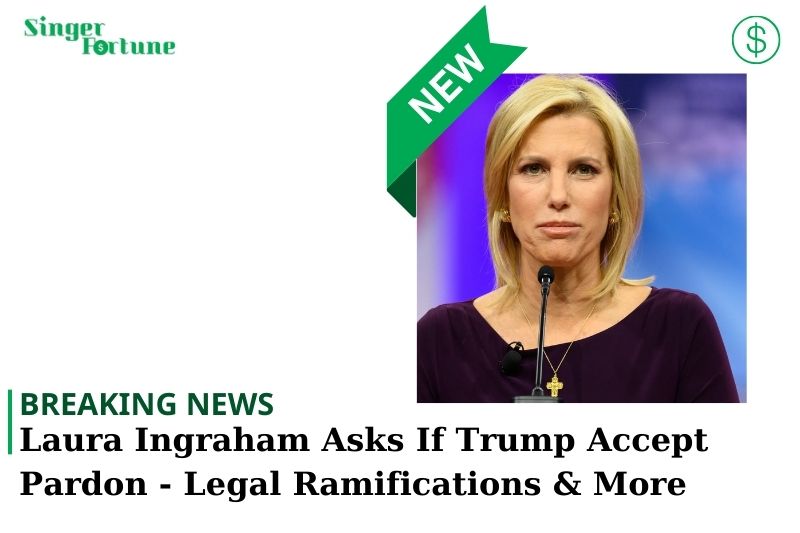In a recent Fox News interview, Laura Ingraham asks if Trump would accept a pardon from President Joe Biden. This question has sparked plenty of discussion, especially considering Trump’s ongoing legal battles.
In this post, we’ll break down what this pardon could mean, why it’s being considered, and what the possible consequences could be for both Trump and Biden. We’ll also touch on some of the political dynamics at play, like how public opinion, the media, and key political figures are reacting to the idea.
Will Donald Trump Accept a Pardon from Joe Biden?

The question of whether Donald Trump would accept a pardon from Joe Biden raises significant legal and political considerations. Presidential pardons are a powerful tool in U.S. politics, often used to close the book on legal cases or to show leniency.
For Trump, accepting a pardon from Biden could theoretically clear his legal slate. However, doing so might be seen as an admission of guilt, which is something Trump has repeatedly denied. So, would he even consider such an offer? That’s the real question.
In his recent interview, Jason Miller, a top adviser to Trump, played it safe, saying he wasn’t sure if Biden would even offer a pardon. But he didn’t shy away from asserting that Trump had done nothing wrong and that all legal issues against him were politically motivated.
It’s clear that Trump’s camp is not keen on discussing a pardon, at least not in any official capacity. They believe that Trump’s legal challenges, whether related to the 2020 election or the mishandling of classified documents, are fading away.
But, the idea of a Trump pardon from Biden has been swirling in the media, and some believe it could be a strategic move. Joe Manchin, the independent senator from West Virginia, even suggested that a Biden pardon for Trump could help balance the political landscape.
While this isn’t a concrete proposal, it’s certainly a suggestion that’s causing a lot of debates.
What Did Jason Miller Say About the Possibility of a Pardon?
When Laura Ingraham asked about Trump accepting a pardon, Jason Miller gave a careful, measured response. He didn’t say flat out that Trump would refuse a pardon but did emphasize that Trump had not committed any crimes.
Miller described the idea of Biden offering a pardon as nonsense and accused the media of using it as a political strategy. His comments suggest that the entire issue of a pardon could be part of a broader media manipulation tactic by the Biden administration.
Interestingly, Ingraham pressed him further, trying to get a more direct answer. However, Miller’s response stayed in line with Trump’s usual rhetoric—denying wrongdoing.
This avoidance of direct answers only adds fuel to the speculation. Would Trump even be open to a pardon? Or is the entire idea just another piece of political theater?
What Are the Legal Implications of a Pardon for Donald Trump?
A presidential pardon can be a game-changer, but it’s not without its complexities. First off, accepting a pardon could allow Trump to walk away from some of the legal charges against him, particularly related to the 2020 election and his mishandling of classified documents.
But there’s a catch. While a pardon can clear criminal charges, it doesn’t remove any civil lawsuits or prevent future legal issues.
For Trump, there’s also the question of whether accepting a pardon would be seen as an admission of guilt. In the past, Trump has vehemently denied any wrongdoing, especially with respect to his involvement in the 2020 election.
Accepting a pardon could send a message that he was, in fact, guilty of those charges—something that could severely damage his credibility and political image.
While Trump may not need a pardon immediately—since many of his cases are stalled or have been dropped—it’s clear that a pardon would likely clean his slate, both legally and publicly. But accepting that offer would be a tricky decision with long-term consequences.
How Does a Presidential Pardon Work and Who Decides?
The presidential pardon is a significant power in the U.S. Constitution, allowing the President to grant clemency to individuals convicted of federal crimes. However, this power is not unlimited.
The President’s decision to offer a pardon often comes after careful consideration, and sometimes, recommendations from legal experts or even the public.
In Trump’s case, a pardon would likely come with a lot of political and public scrutiny. Biden would have to consider not only the legal implications of pardoning Trump but also the political fallout.
Offering a pardon to Trump could be seen as an attempt at healing political divisions, but it could also be viewed as an act of political appeasement or favoritism. The decision would not be taken lightly.
What Did Joe Manchin Say About a Possible Trump Pardon?

Joe Manchin, the independent senator from West Virginia, made waves recently when he suggested that President Biden should consider pardoning Donald Trump.
Manchin argued that such a move would help balance the political dynamics in the country, particularly in light of Biden’s decision to pardon his son, Hunter Biden. Manchin’s call for a Trump pardon was aimed at reducing political tensions and fostering national unity, but not everyone agreed with his suggestion.
Manchin’s position reflects a broader bipartisan push to find a compromise that could heal some of the wounds from the 2020 election. While some Democrats may see a Trump pardon as too controversial, others argue that it’s a step toward reconciliation in a polarized political landscape.
What Are the Political Ramifications of a Trump Pardon?
A Trump pardon would have significant political consequences. For President Biden, offering a pardon to his predecessor could either solidify his reputation as a unifier or create more political divides.
Many Republicans would likely see a pardon as a fair gesture, but many Democrats might view it as an overreach. For Trump, accepting a pardon could either help him clear his name or undermine his claims of innocence.
The political fallout from such a move could go in many directions, depending on how both sides spin it. It’s a delicate decision that would require balancing legal, political, and public perceptions.
What Is the Public’s View on Pardoning Donald Trump?
Public opinion on the idea of pardoning Donald Trump is mixed. Some surveys show that a large portion of Americans feel that a pardon would be politically motivated, while others believe that it’s a way to end the legal battles once and for all.
The public’s perception of Trump’s guilt or innocence plays a major role in how they view the possibility of a pardon.
In some polls, Republicans are more likely to support the idea of a Trump pardon, seeing it as a necessary step for healing political divides. Democrats, on the other hand, may view it as an unnecessary act that could undermine accountability.
What Are the Alternatives to a Pardon for Trump?
If Biden decides not to offer a Trump pardon, there are other legal routes Trump could take. For example, he might continue his defense in court, possibly winning some cases outright or having charges dropped. Another possibility is that he could negotiate a settlement for some of his cases, avoiding the need for a pardon altogether.
Regardless of the outcome, Trump’s legal journey is far from over, and the possibility of a pardon may only be one part of the story.
Conclusion
The question of whether Trump will accept a pardon remains up in the air, and it’s one that will likely continue to dominate headlines for the foreseeable future. If you’re curious to dive deeper into these debates and explore more about the political landscape, don’t forget to visit us at SingerFortune for more insights. Feel free to leave your thoughts in the comments or share this article with your network!

